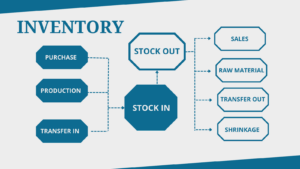In today’s competitive market, small businesses, including retail jewelry shops and rice mills, must efficiently manage their finances to thrive. An effective accounting management software can play a crucial role in this process, streamlining financial operations and enhancing decision-making capabilities. In this comprehensive guide, we will explore the significance of accounting management systems, their benefits for retail jewellery management and rice mill management, and how these tools can transform small business management.
Understanding Accounting Management Software
Accounting management software is designed to automate and streamline the financial processes of a business. This type of software allows businesses to manage their finances, including invoicing, expense tracking, payroll, and financial reporting, all in one place. The main goal of an accounting management system is to provide business owners with real-time insights into their financial health, enabling them to make informed decisions.
Key Features of Accounting Management Systems
- Invoicing and Billing: One of the primary features of accounting management software is its ability to generate invoices and bills automatically. This feature helps businesses get paid faster and reduces the risk of errors.
- Expense Tracking: Accounting management systems allow businesses to track their expenses easily. By categorizing expenses, business owners can identify areas where they can cut costs and improve profitability.
- Payroll Management: Managing payroll can be complex and time-consuming, but accounting software simplifies the process. It automates calculations for salaries, deductions, and tax withholdings, ensuring compliance with labor laws.
- Financial Reporting: Accurate financial reporting is vital for making informed business decisions. Accounting management software generates various reports, including profit and loss statements, balance sheets, and cash flow statements.
- Inventory Management: For businesses like retail jewelry shops, inventory management is crucial. Accounting software can track inventory levels, sales trends, and reorder points, helping prevent stockouts or overstocking.
- Tax Compliance: Staying compliant with tax regulations can be challenging for small businesses. Accounting management systems help by automating tax calculations and generating tax reports, simplifying the filing process.
Benefits of Accounting Management Software for Retail Jewelry Management
1. Improved Financial Accuracy
Retail jewelry businesses handle a variety of transactions daily, from sales to supplier payments. An accounting management system reduces the risk of human error in financial data entry, ensuring accuracy in financial records. This accuracy is critical for maintaining trust with customers and suppliers.
2. Enhanced Cash Flow Management
Understanding cash flow is essential for retail jewelry shops, especially during peak seasons. Accounting management software provides real-time insights into cash flow, allowing business owners to make timely decisions regarding inventory purchases and expenses. With accurate cash flow projections, businesses can avoid cash shortages that could disrupt operations.
3. Streamlined Inventory Control
Jewelry retailers need to manage their inventory effectively to meet customer demands while minimizing excess stock. Accounting management software with integrated inventory management features helps track stock levels, sales trends, and customer preferences. This data enables retailers to make informed decisions about restocking and promotions.
4. Simplified Customer Relationship Management
Building strong relationships with customers is vital for retail jewelry businesses. Accounting management systems often include customer relationship management (CRM) features that allow businesses to track customer interactions, preferences, and purchase history. This information can be used to personalize marketing efforts and enhance customer satisfaction.
Benefits of Accounting Management Software for Rice Mill Management
1. Efficient Cost Tracking
Rice mill management involves multiple processes, from procurement to production and sales. An accounting management system helps track costs associated with each process, enabling mill operators to identify areas for improvement. By analyzing cost data, businesses can make strategic decisions that enhance profitability.
2. Streamlined Production Planning
For rice mills, production planning is critical to meeting market demand while minimizing waste. Accounting management software can help forecast production needs based on sales trends, historical data, and seasonal fluctuations. This capability enables businesses to optimize their production schedules and reduce idle time.
3. Enhanced Financial Visibility
Understanding the financial health of a rice mill is essential for long-term sustainability. Accounting management software provides real-time financial insights, including revenue, expenses, and profit margins. This visibility allows mill operators to make informed decisions regarding pricing, investments, and expansion opportunities.
4. Compliance with Regulatory Requirements
The rice milling industry is subject to various regulatory requirements, including quality control and safety standards. Accounting management systems can help ensure compliance by maintaining accurate financial records and generating reports required by regulatory bodies.
Choosing the Right Accounting Management Software for Small Business Management
When selecting accounting management software for small businesses, it’s essential to consider several factors to ensure the software meets specific business needs.
1. Scalability
As a small business grows, its financial management needs will evolve. Choose software that can scale with your business, offering additional features and functionality as needed. This flexibility ensures that your accounting management system remains relevant and effective over time.
2. User-Friendly Interface
An intuitive interface is crucial for ensuring that all team members can navigate the software easily. A user-friendly accounting management system minimizes training time and encourages team adoption, leading to better overall efficiency.
3. Integration Capabilities
Consider accounting management software that integrates seamlessly with other business systems, such as inventory management, point of sale (POS) systems, and customer relationship management software. Integration streamlines processes and eliminates data silos, enhancing overall operational efficiency.
4. Customer Support
Reliable customer support is essential when implementing accounting management software. Choose a provider that offers responsive support, training resources, and documentation to assist users in navigating any challenges that may arise.
Conclusion
In conclusion, implementing accounting management software is a vital step for small businesses, including retail jewelry shops and rice mills. By utilizing these systems, businesses can enhance financial accuracy, improve cash flow management, streamline operations, and ensure compliance with regulations. As small businesses strive for growth and sustainability, investing in an effective accounting management system is not just beneficial—it’s essential for success in today’s competitive marketplace. Whether you are managing a retail jewelry shop or a rice mill, choosing the right accounting management software can provide the necessary tools to optimize your financial operations and achieve long-term business goals.













